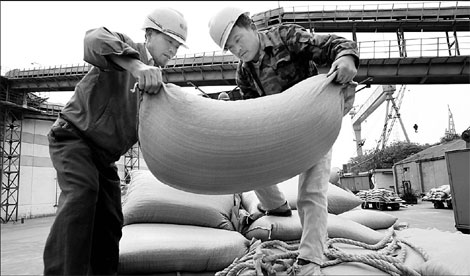Business
Soybean imports set to surge
(China Daily)
Updated: 2010-10-14 07:56
 |
Large Medium Small |
|
Workers unload imported beans at a port on the Yangtze River. [Xu Congjun / for China Daily] |
Increase will only have limited domestic impact in the short term
BEIJING - The surge in China's imports of soybeans is expected to continue, but will only have a limited impact on domestic producers in the short term, agricultural analysts said on Wednesday.
Imports reached a new high of 40.16 million tons in the first nine months of this year, almost equivalent to the total figure of 42.55 million tons in 2009, according to data from the General Administration of Customs.
Imports of soybeans for the fourth quarter are now estimated at 13.8 million tons, 3.6 million more than the same period last year, according to a report released by Grain.gov.cn, a website operated by the ChinaNational Grain and Oils Information Center.
The Ministry of Commerce has also raised its forecast for October imports from 3.32 million tons to 4.15 million, an increase of 0.83 million tons.
This is the third consecutive year that soybean imports have increased, from 37.44 million tons in 2008, to an estimated 53.96 million this year.
"The surge in imports reflects the big supply shortage in China's food market," Hu Bingchuan, an assistant researcher at the Rural Development Institute of the Chinese Academy of Social Sciences, told China Daily.
China produces about 15 million tons of soybeans every year, equivalent to about one third of the annual import figure, and not enough to meet domestic demand.
At the meantime, ongoing urbanization has triggered an increase in consumption of soy oil and meat.
Demand for vegetable oil is increasing by around 6 percent per annum, according to the latest industry data, with most of the imported beans used in the manufacture of soy oil and animal feed.
At current production levels, imports of soybeans are very likely to continue to increase, said Hu.
Compared with indigenous soybeans, the imported variety costs 15 percent less, making them more attractive to the soy oil industry.
The continued importation of the beans has provoked concern about the future for domestic producers, but analysts see no immediate danger.
"Imported soybeans have only a limited impact on the domestic industry due to their different uses. Imported beans are mostly used to make soy oil, while the indigenous kind are used in food production," said Zhang Xiaoping, who is based in China as acting director of American Soybean Association-International Marketing.
"Of 15 million tons of soybeans produced every year in China, 10 million were made into food. However as demand continues to grow, the day when all 15 million are used for food may not so far away," Hu said.
China Daily
